Module Analysis: Insights on Leadership and Organizational Power
VerifiedAdded on 2022/10/04
|7
|1868
|488
Report
AI Summary
This report analyzes the learning experience from two leadership modules, focusing on the evolution of leadership concepts, particularly authentic leadership and organizational power dynamics. The student reflects on the impact of different leadership theories and models, including authoritarian, participative, and laissez-faire styles, and how they influence team motivation. The analysis highlights the significance of authentic leadership in fostering ethical foundations, transparency, and addressing workplace discrimination. The student explores the challenges in maintaining authentic leadership and its connection to other leadership styles, drawing from real-world examples like Google, Amazon, and Ford. The report concludes with a changed perspective on the importance of leadership in business growth and a distinction between management and leadership, emphasizing the modules' value for beginners in business management. The student also points out the need to connect authentic leadership with other styles for practical application.
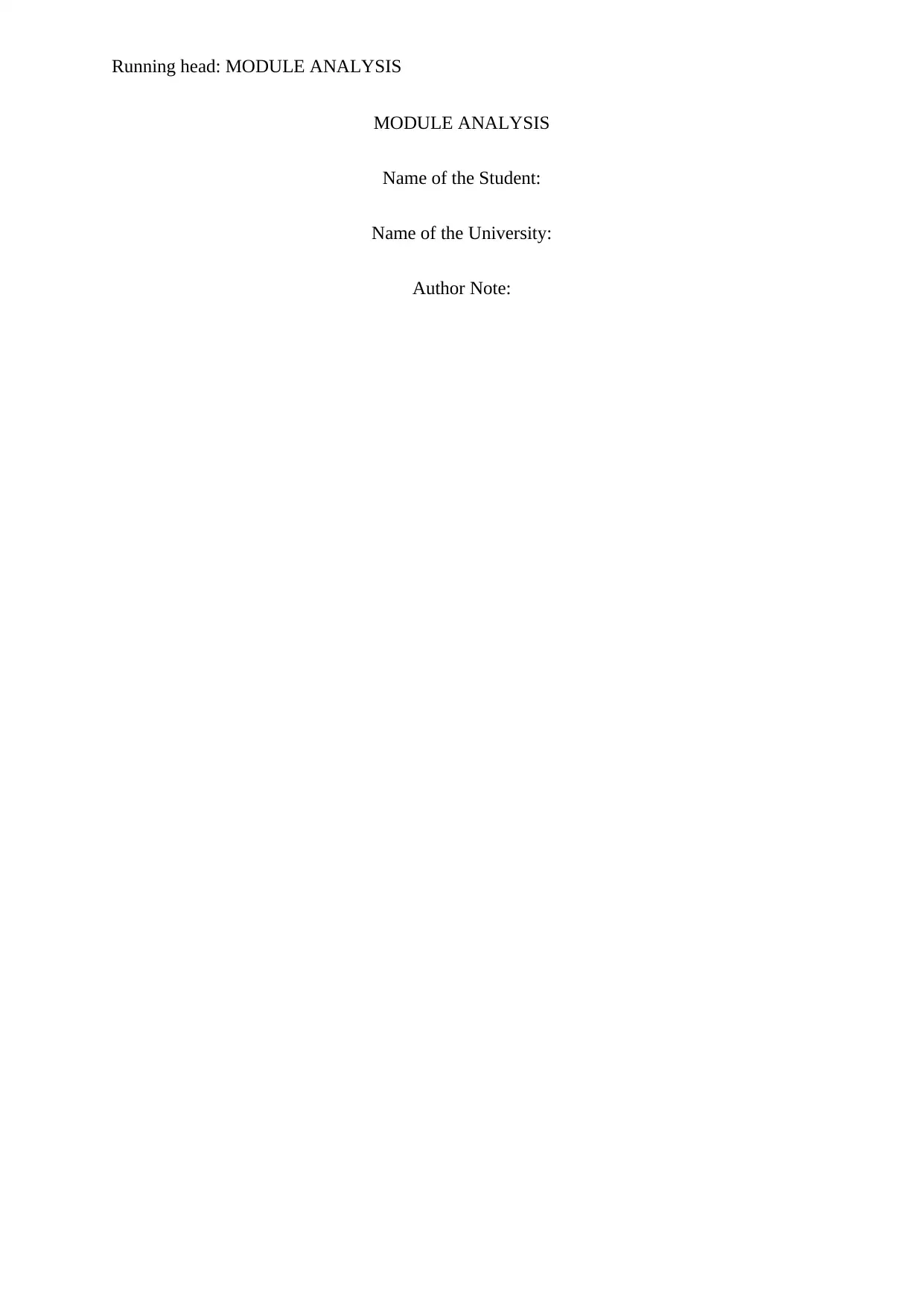
Running head: MODULE ANALYSIS
MODULE ANALYSIS
Name of the Student:
Name of the University:
Author Note:
MODULE ANALYSIS
Name of the Student:
Name of the University:
Author Note:
Paraphrase This Document
Need a fresh take? Get an instant paraphrase of this document with our AI Paraphraser
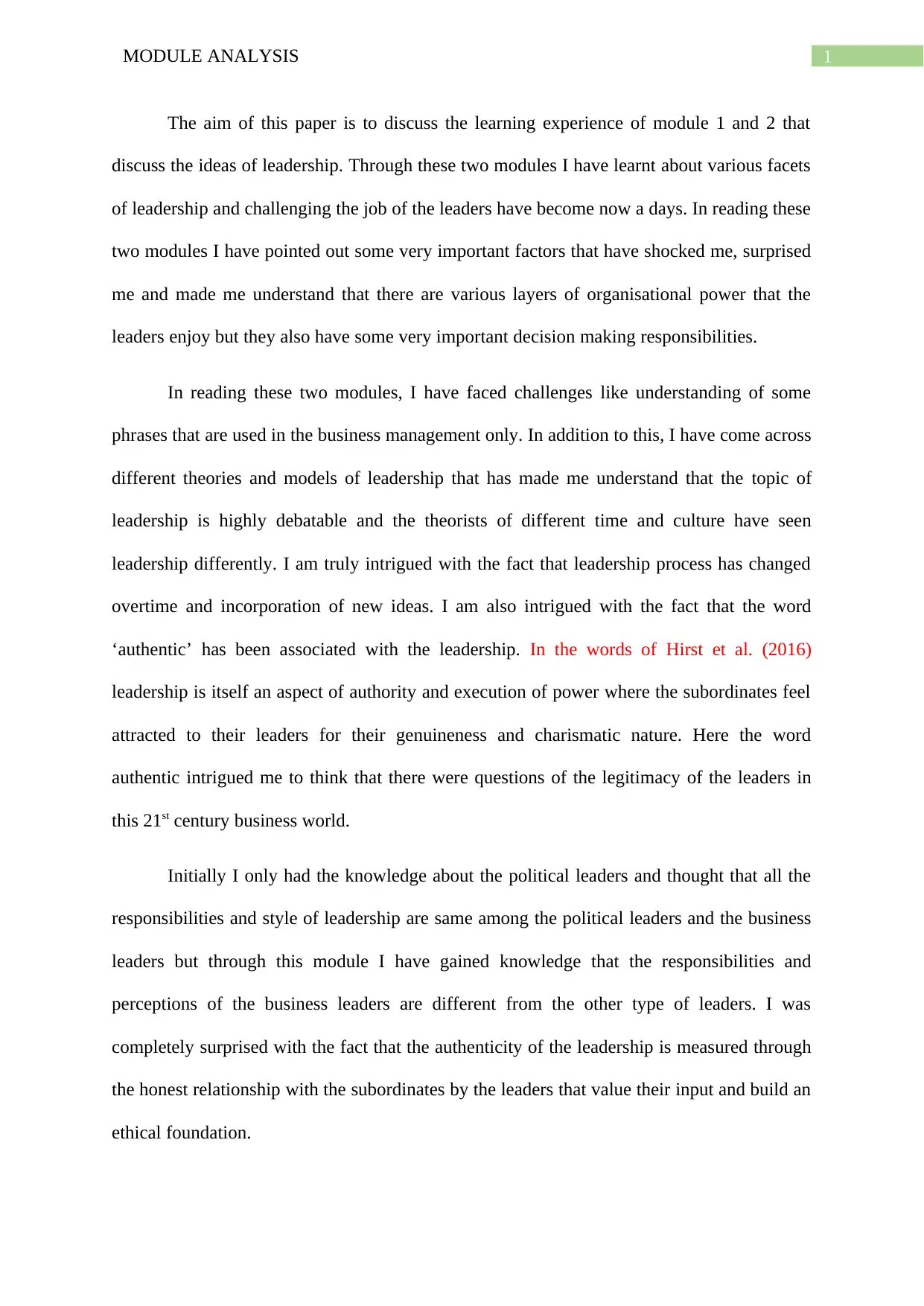
1MODULE ANALYSIS
The aim of this paper is to discuss the learning experience of module 1 and 2 that
discuss the ideas of leadership. Through these two modules I have learnt about various facets
of leadership and challenging the job of the leaders have become now a days. In reading these
two modules I have pointed out some very important factors that have shocked me, surprised
me and made me understand that there are various layers of organisational power that the
leaders enjoy but they also have some very important decision making responsibilities.
In reading these two modules, I have faced challenges like understanding of some
phrases that are used in the business management only. In addition to this, I have come across
different theories and models of leadership that has made me understand that the topic of
leadership is highly debatable and the theorists of different time and culture have seen
leadership differently. I am truly intrigued with the fact that leadership process has changed
overtime and incorporation of new ideas. I am also intrigued with the fact that the word
‘authentic’ has been associated with the leadership. In the words of Hirst et al. (2016)
leadership is itself an aspect of authority and execution of power where the subordinates feel
attracted to their leaders for their genuineness and charismatic nature. Here the word
authentic intrigued me to think that there were questions of the legitimacy of the leaders in
this 21st century business world.
Initially I only had the knowledge about the political leaders and thought that all the
responsibilities and style of leadership are same among the political leaders and the business
leaders but through this module I have gained knowledge that the responsibilities and
perceptions of the business leaders are different from the other type of leaders. I was
completely surprised with the fact that the authenticity of the leadership is measured through
the honest relationship with the subordinates by the leaders that value their input and build an
ethical foundation.
The aim of this paper is to discuss the learning experience of module 1 and 2 that
discuss the ideas of leadership. Through these two modules I have learnt about various facets
of leadership and challenging the job of the leaders have become now a days. In reading these
two modules I have pointed out some very important factors that have shocked me, surprised
me and made me understand that there are various layers of organisational power that the
leaders enjoy but they also have some very important decision making responsibilities.
In reading these two modules, I have faced challenges like understanding of some
phrases that are used in the business management only. In addition to this, I have come across
different theories and models of leadership that has made me understand that the topic of
leadership is highly debatable and the theorists of different time and culture have seen
leadership differently. I am truly intrigued with the fact that leadership process has changed
overtime and incorporation of new ideas. I am also intrigued with the fact that the word
‘authentic’ has been associated with the leadership. In the words of Hirst et al. (2016)
leadership is itself an aspect of authority and execution of power where the subordinates feel
attracted to their leaders for their genuineness and charismatic nature. Here the word
authentic intrigued me to think that there were questions of the legitimacy of the leaders in
this 21st century business world.
Initially I only had the knowledge about the political leaders and thought that all the
responsibilities and style of leadership are same among the political leaders and the business
leaders but through this module I have gained knowledge that the responsibilities and
perceptions of the business leaders are different from the other type of leaders. I was
completely surprised with the fact that the authenticity of the leadership is measured through
the honest relationship with the subordinates by the leaders that value their input and build an
ethical foundation.
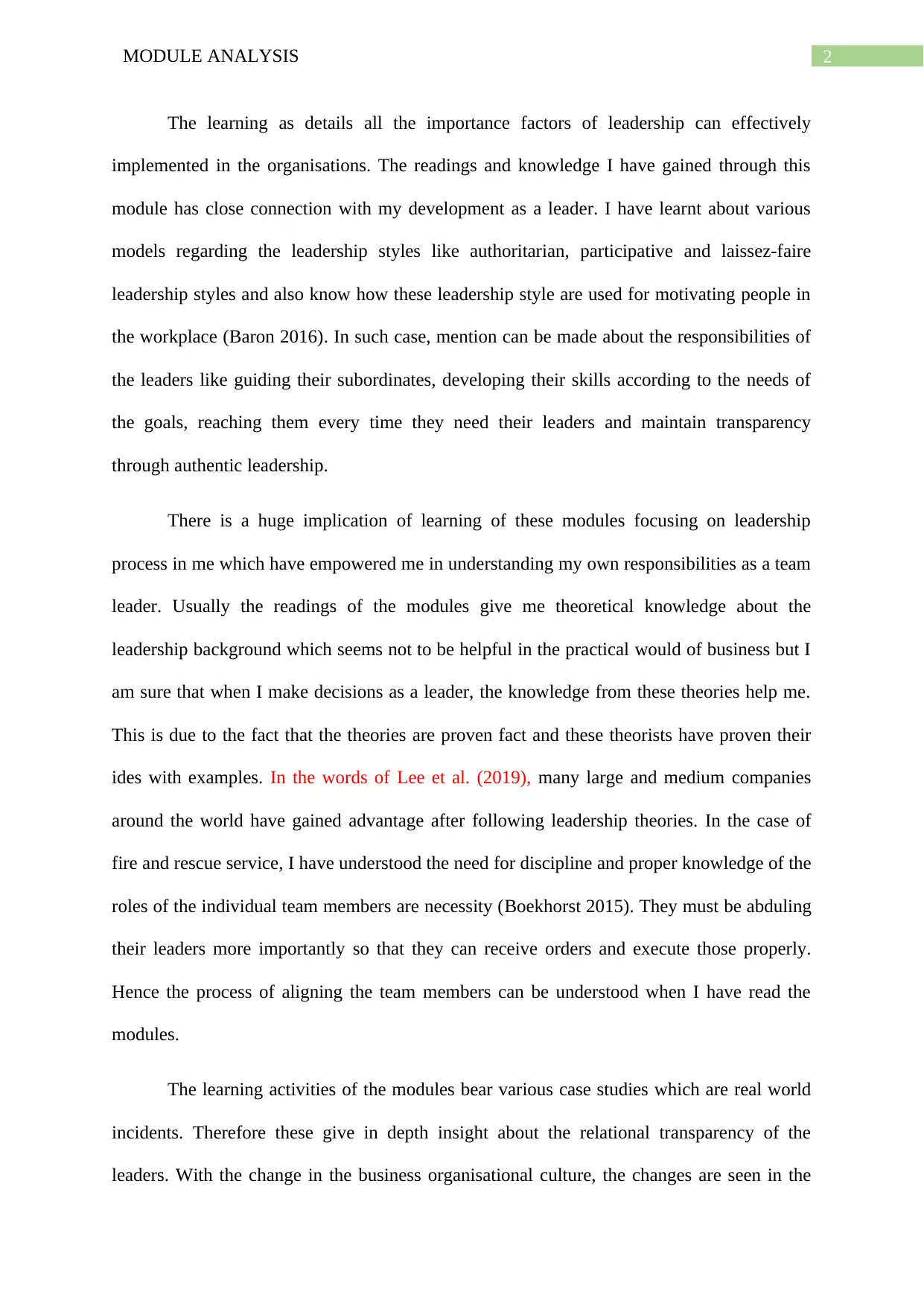
2MODULE ANALYSIS
The learning as details all the importance factors of leadership can effectively
implemented in the organisations. The readings and knowledge I have gained through this
module has close connection with my development as a leader. I have learnt about various
models regarding the leadership styles like authoritarian, participative and laissez-faire
leadership styles and also know how these leadership style are used for motivating people in
the workplace (Baron 2016). In such case, mention can be made about the responsibilities of
the leaders like guiding their subordinates, developing their skills according to the needs of
the goals, reaching them every time they need their leaders and maintain transparency
through authentic leadership.
There is a huge implication of learning of these modules focusing on leadership
process in me which have empowered me in understanding my own responsibilities as a team
leader. Usually the readings of the modules give me theoretical knowledge about the
leadership background which seems not to be helpful in the practical would of business but I
am sure that when I make decisions as a leader, the knowledge from these theories help me.
This is due to the fact that the theories are proven fact and these theorists have proven their
ides with examples. In the words of Lee et al. (2019), many large and medium companies
around the world have gained advantage after following leadership theories. In the case of
fire and rescue service, I have understood the need for discipline and proper knowledge of the
roles of the individual team members are necessity (Boekhorst 2015). They must be abduling
their leaders more importantly so that they can receive orders and execute those properly.
Hence the process of aligning the team members can be understood when I have read the
modules.
The learning activities of the modules bear various case studies which are real world
incidents. Therefore these give in depth insight about the relational transparency of the
leaders. With the change in the business organisational culture, the changes are seen in the
The learning as details all the importance factors of leadership can effectively
implemented in the organisations. The readings and knowledge I have gained through this
module has close connection with my development as a leader. I have learnt about various
models regarding the leadership styles like authoritarian, participative and laissez-faire
leadership styles and also know how these leadership style are used for motivating people in
the workplace (Baron 2016). In such case, mention can be made about the responsibilities of
the leaders like guiding their subordinates, developing their skills according to the needs of
the goals, reaching them every time they need their leaders and maintain transparency
through authentic leadership.
There is a huge implication of learning of these modules focusing on leadership
process in me which have empowered me in understanding my own responsibilities as a team
leader. Usually the readings of the modules give me theoretical knowledge about the
leadership background which seems not to be helpful in the practical would of business but I
am sure that when I make decisions as a leader, the knowledge from these theories help me.
This is due to the fact that the theories are proven fact and these theorists have proven their
ides with examples. In the words of Lee et al. (2019), many large and medium companies
around the world have gained advantage after following leadership theories. In the case of
fire and rescue service, I have understood the need for discipline and proper knowledge of the
roles of the individual team members are necessity (Boekhorst 2015). They must be abduling
their leaders more importantly so that they can receive orders and execute those properly.
Hence the process of aligning the team members can be understood when I have read the
modules.
The learning activities of the modules bear various case studies which are real world
incidents. Therefore these give in depth insight about the relational transparency of the
leaders. With the change in the business organisational culture, the changes are seen in the
⊘ This is a preview!⊘
Do you want full access?
Subscribe today to unlock all pages.

Trusted by 1+ million students worldwide
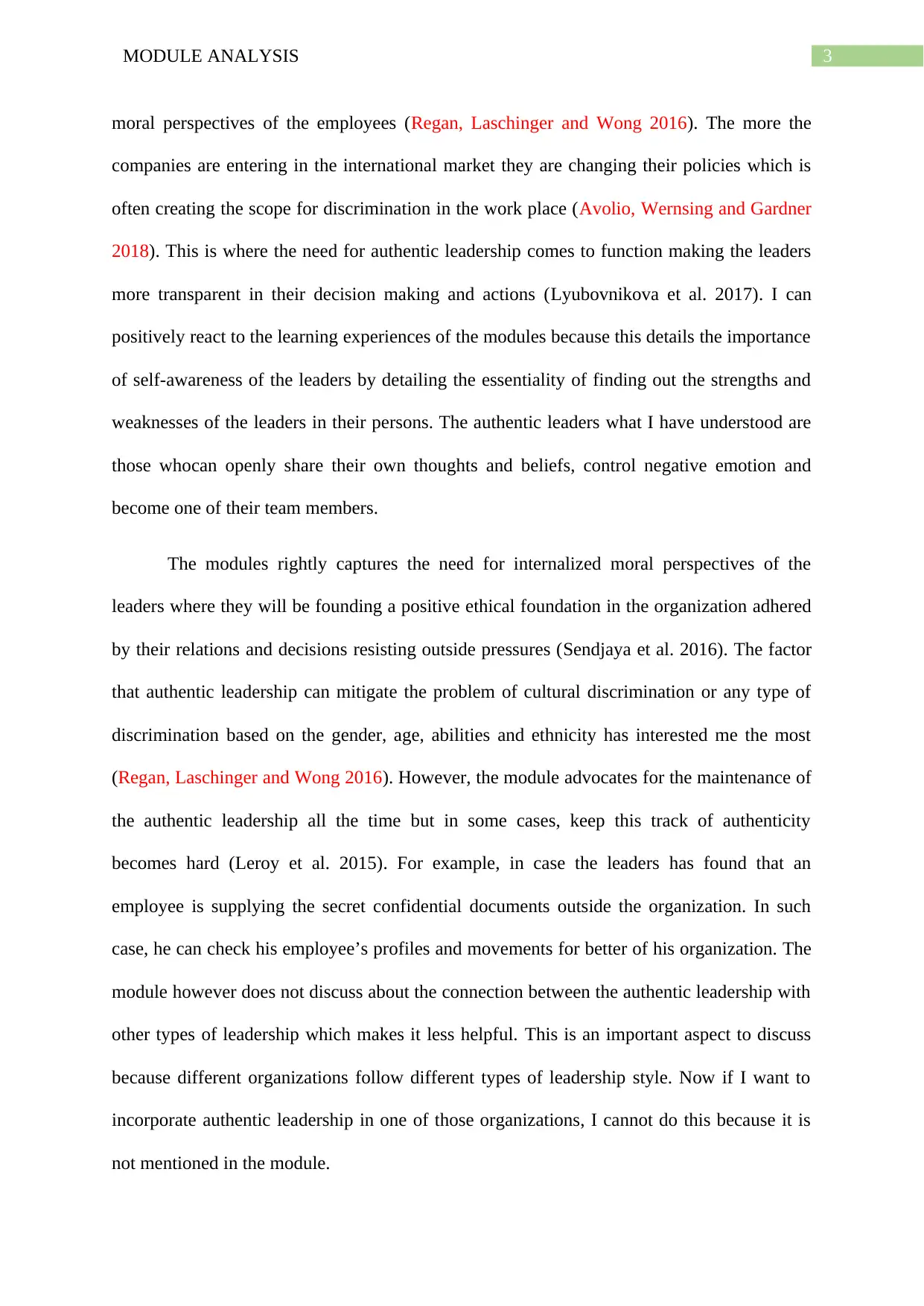
3MODULE ANALYSIS
moral perspectives of the employees (Regan, Laschinger and Wong 2016). The more the
companies are entering in the international market they are changing their policies which is
often creating the scope for discrimination in the work place (Avolio, Wernsing and Gardner
2018). This is where the need for authentic leadership comes to function making the leaders
more transparent in their decision making and actions (Lyubovnikova et al. 2017). I can
positively react to the learning experiences of the modules because this details the importance
of self-awareness of the leaders by detailing the essentiality of finding out the strengths and
weaknesses of the leaders in their persons. The authentic leaders what I have understood are
those whocan openly share their own thoughts and beliefs, control negative emotion and
become one of their team members.
The modules rightly captures the need for internalized moral perspectives of the
leaders where they will be founding a positive ethical foundation in the organization adhered
by their relations and decisions resisting outside pressures (Sendjaya et al. 2016). The factor
that authentic leadership can mitigate the problem of cultural discrimination or any type of
discrimination based on the gender, age, abilities and ethnicity has interested me the most
(Regan, Laschinger and Wong 2016). However, the module advocates for the maintenance of
the authentic leadership all the time but in some cases, keep this track of authenticity
becomes hard (Leroy et al. 2015). For example, in case the leaders has found that an
employee is supplying the secret confidential documents outside the organization. In such
case, he can check his employee’s profiles and movements for better of his organization. The
module however does not discuss about the connection between the authentic leadership with
other types of leadership which makes it less helpful. This is an important aspect to discuss
because different organizations follow different types of leadership style. Now if I want to
incorporate authentic leadership in one of those organizations, I cannot do this because it is
not mentioned in the module.
moral perspectives of the employees (Regan, Laschinger and Wong 2016). The more the
companies are entering in the international market they are changing their policies which is
often creating the scope for discrimination in the work place (Avolio, Wernsing and Gardner
2018). This is where the need for authentic leadership comes to function making the leaders
more transparent in their decision making and actions (Lyubovnikova et al. 2017). I can
positively react to the learning experiences of the modules because this details the importance
of self-awareness of the leaders by detailing the essentiality of finding out the strengths and
weaknesses of the leaders in their persons. The authentic leaders what I have understood are
those whocan openly share their own thoughts and beliefs, control negative emotion and
become one of their team members.
The modules rightly captures the need for internalized moral perspectives of the
leaders where they will be founding a positive ethical foundation in the organization adhered
by their relations and decisions resisting outside pressures (Sendjaya et al. 2016). The factor
that authentic leadership can mitigate the problem of cultural discrimination or any type of
discrimination based on the gender, age, abilities and ethnicity has interested me the most
(Regan, Laschinger and Wong 2016). However, the module advocates for the maintenance of
the authentic leadership all the time but in some cases, keep this track of authenticity
becomes hard (Leroy et al. 2015). For example, in case the leaders has found that an
employee is supplying the secret confidential documents outside the organization. In such
case, he can check his employee’s profiles and movements for better of his organization. The
module however does not discuss about the connection between the authentic leadership with
other types of leadership which makes it less helpful. This is an important aspect to discuss
because different organizations follow different types of leadership style. Now if I want to
incorporate authentic leadership in one of those organizations, I cannot do this because it is
not mentioned in the module.
Paraphrase This Document
Need a fresh take? Get an instant paraphrase of this document with our AI Paraphraser
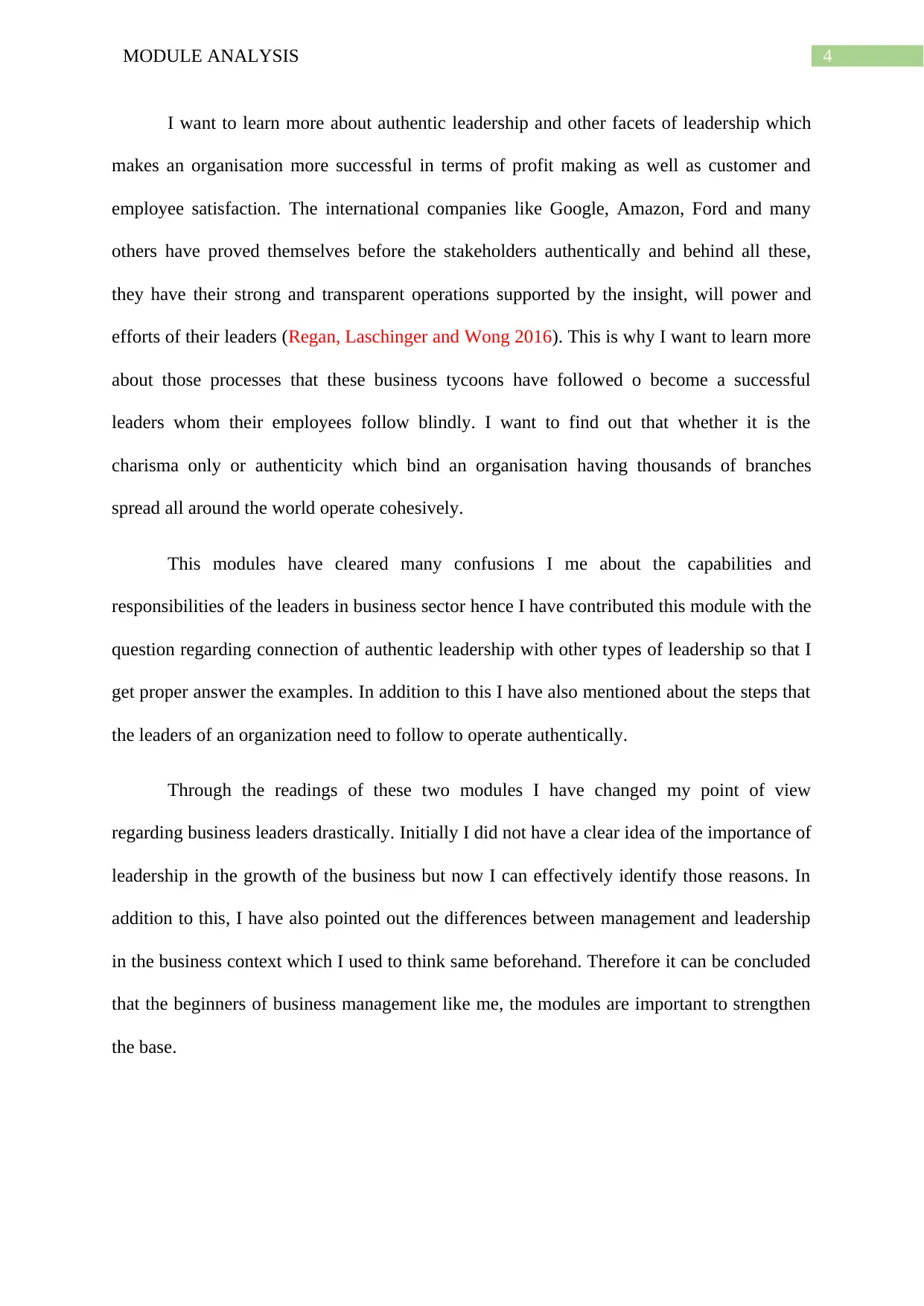
4MODULE ANALYSIS
I want to learn more about authentic leadership and other facets of leadership which
makes an organisation more successful in terms of profit making as well as customer and
employee satisfaction. The international companies like Google, Amazon, Ford and many
others have proved themselves before the stakeholders authentically and behind all these,
they have their strong and transparent operations supported by the insight, will power and
efforts of their leaders (Regan, Laschinger and Wong 2016). This is why I want to learn more
about those processes that these business tycoons have followed o become a successful
leaders whom their employees follow blindly. I want to find out that whether it is the
charisma only or authenticity which bind an organisation having thousands of branches
spread all around the world operate cohesively.
This modules have cleared many confusions I me about the capabilities and
responsibilities of the leaders in business sector hence I have contributed this module with the
question regarding connection of authentic leadership with other types of leadership so that I
get proper answer the examples. In addition to this I have also mentioned about the steps that
the leaders of an organization need to follow to operate authentically.
Through the readings of these two modules I have changed my point of view
regarding business leaders drastically. Initially I did not have a clear idea of the importance of
leadership in the growth of the business but now I can effectively identify those reasons. In
addition to this, I have also pointed out the differences between management and leadership
in the business context which I used to think same beforehand. Therefore it can be concluded
that the beginners of business management like me, the modules are important to strengthen
the base.
I want to learn more about authentic leadership and other facets of leadership which
makes an organisation more successful in terms of profit making as well as customer and
employee satisfaction. The international companies like Google, Amazon, Ford and many
others have proved themselves before the stakeholders authentically and behind all these,
they have their strong and transparent operations supported by the insight, will power and
efforts of their leaders (Regan, Laschinger and Wong 2016). This is why I want to learn more
about those processes that these business tycoons have followed o become a successful
leaders whom their employees follow blindly. I want to find out that whether it is the
charisma only or authenticity which bind an organisation having thousands of branches
spread all around the world operate cohesively.
This modules have cleared many confusions I me about the capabilities and
responsibilities of the leaders in business sector hence I have contributed this module with the
question regarding connection of authentic leadership with other types of leadership so that I
get proper answer the examples. In addition to this I have also mentioned about the steps that
the leaders of an organization need to follow to operate authentically.
Through the readings of these two modules I have changed my point of view
regarding business leaders drastically. Initially I did not have a clear idea of the importance of
leadership in the growth of the business but now I can effectively identify those reasons. In
addition to this, I have also pointed out the differences between management and leadership
in the business context which I used to think same beforehand. Therefore it can be concluded
that the beginners of business management like me, the modules are important to strengthen
the base.
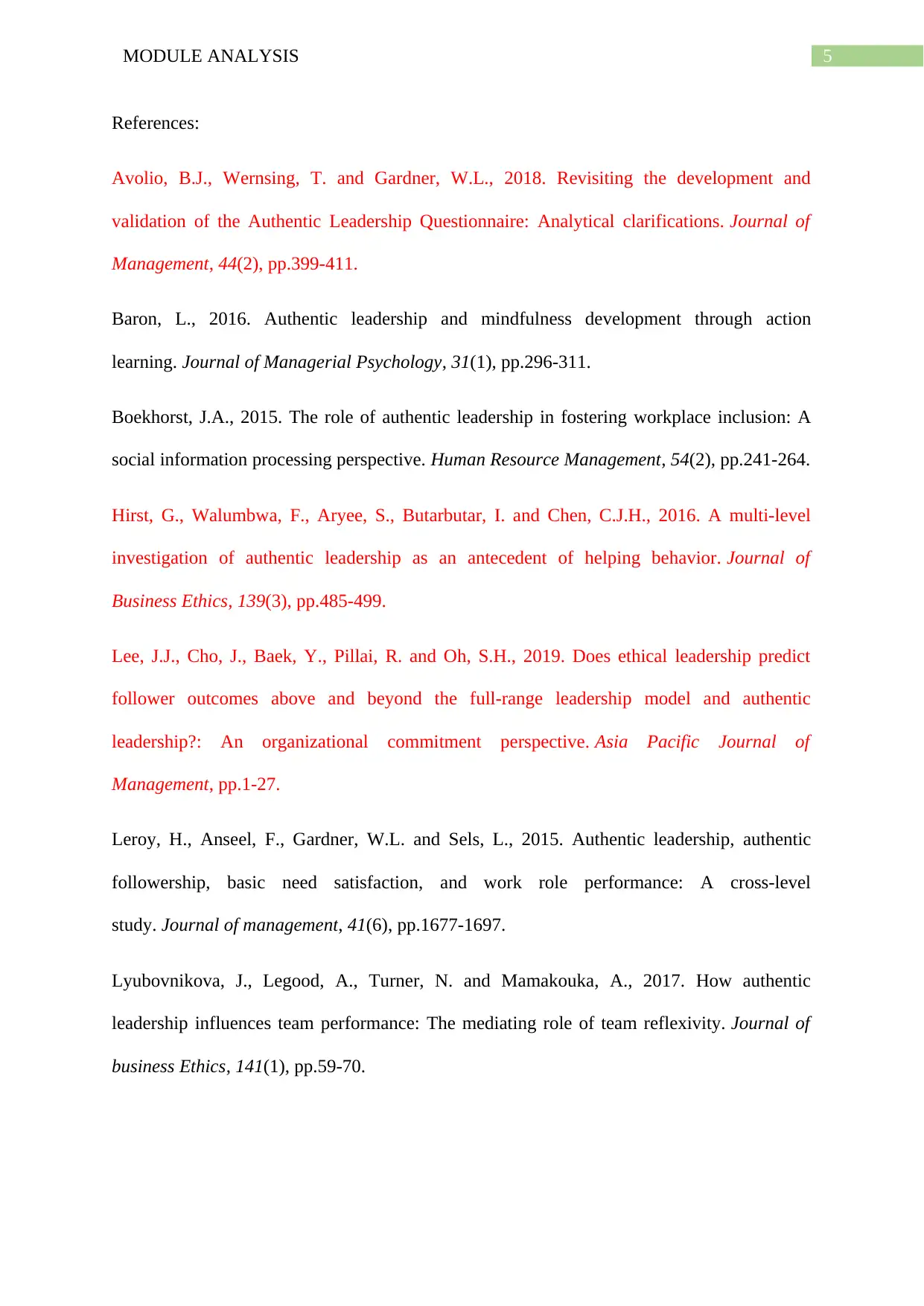
5MODULE ANALYSIS
References:
Avolio, B.J., Wernsing, T. and Gardner, W.L., 2018. Revisiting the development and
validation of the Authentic Leadership Questionnaire: Analytical clarifications. Journal of
Management, 44(2), pp.399-411.
Baron, L., 2016. Authentic leadership and mindfulness development through action
learning. Journal of Managerial Psychology, 31(1), pp.296-311.
Boekhorst, J.A., 2015. The role of authentic leadership in fostering workplace inclusion: A
social information processing perspective. Human Resource Management, 54(2), pp.241-264.
Hirst, G., Walumbwa, F., Aryee, S., Butarbutar, I. and Chen, C.J.H., 2016. A multi-level
investigation of authentic leadership as an antecedent of helping behavior. Journal of
Business Ethics, 139(3), pp.485-499.
Lee, J.J., Cho, J., Baek, Y., Pillai, R. and Oh, S.H., 2019. Does ethical leadership predict
follower outcomes above and beyond the full-range leadership model and authentic
leadership?: An organizational commitment perspective. Asia Pacific Journal of
Management, pp.1-27.
Leroy, H., Anseel, F., Gardner, W.L. and Sels, L., 2015. Authentic leadership, authentic
followership, basic need satisfaction, and work role performance: A cross-level
study. Journal of management, 41(6), pp.1677-1697.
Lyubovnikova, J., Legood, A., Turner, N. and Mamakouka, A., 2017. How authentic
leadership influences team performance: The mediating role of team reflexivity. Journal of
business Ethics, 141(1), pp.59-70.
References:
Avolio, B.J., Wernsing, T. and Gardner, W.L., 2018. Revisiting the development and
validation of the Authentic Leadership Questionnaire: Analytical clarifications. Journal of
Management, 44(2), pp.399-411.
Baron, L., 2016. Authentic leadership and mindfulness development through action
learning. Journal of Managerial Psychology, 31(1), pp.296-311.
Boekhorst, J.A., 2015. The role of authentic leadership in fostering workplace inclusion: A
social information processing perspective. Human Resource Management, 54(2), pp.241-264.
Hirst, G., Walumbwa, F., Aryee, S., Butarbutar, I. and Chen, C.J.H., 2016. A multi-level
investigation of authentic leadership as an antecedent of helping behavior. Journal of
Business Ethics, 139(3), pp.485-499.
Lee, J.J., Cho, J., Baek, Y., Pillai, R. and Oh, S.H., 2019. Does ethical leadership predict
follower outcomes above and beyond the full-range leadership model and authentic
leadership?: An organizational commitment perspective. Asia Pacific Journal of
Management, pp.1-27.
Leroy, H., Anseel, F., Gardner, W.L. and Sels, L., 2015. Authentic leadership, authentic
followership, basic need satisfaction, and work role performance: A cross-level
study. Journal of management, 41(6), pp.1677-1697.
Lyubovnikova, J., Legood, A., Turner, N. and Mamakouka, A., 2017. How authentic
leadership influences team performance: The mediating role of team reflexivity. Journal of
business Ethics, 141(1), pp.59-70.
⊘ This is a preview!⊘
Do you want full access?
Subscribe today to unlock all pages.

Trusted by 1+ million students worldwide
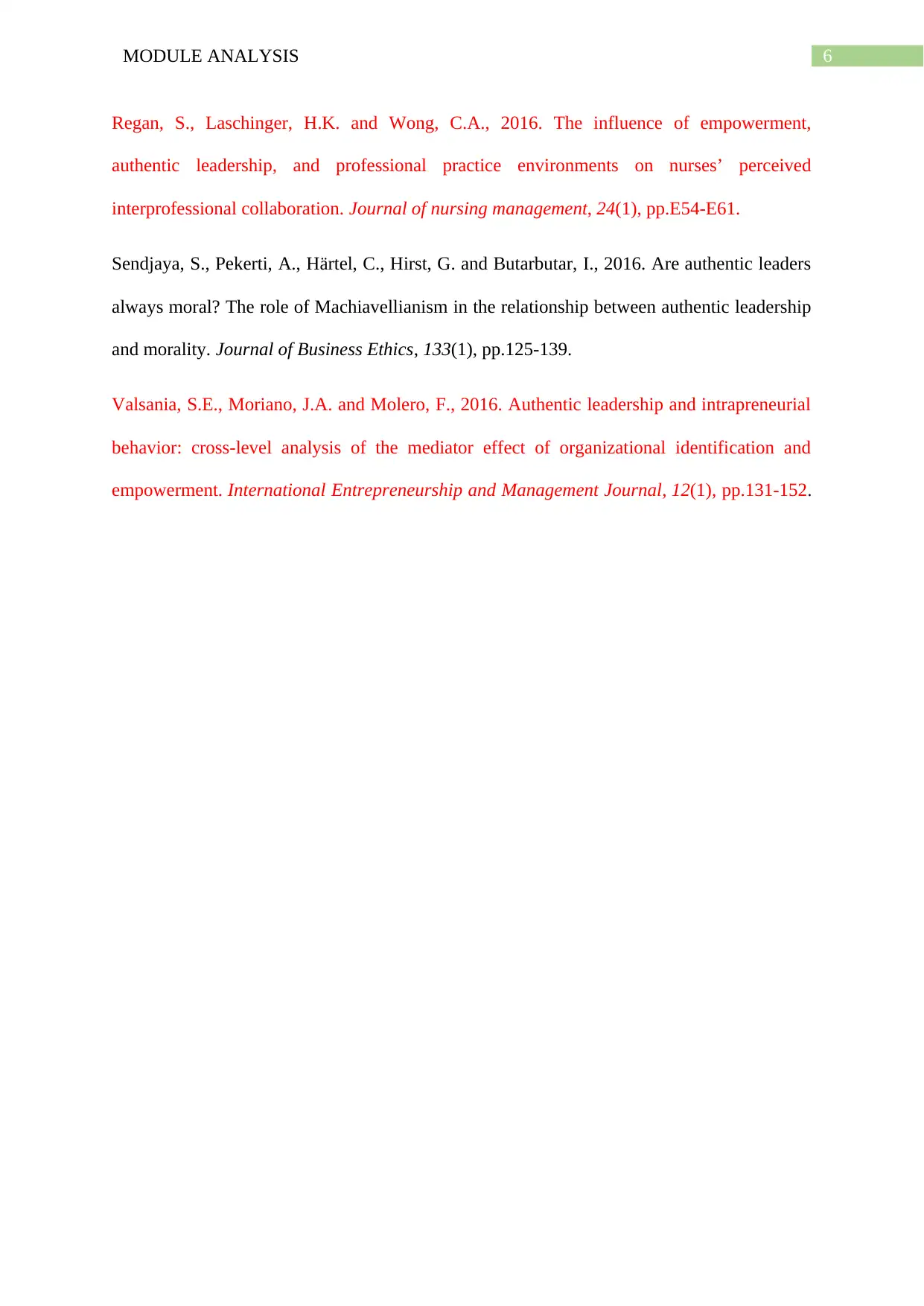
6MODULE ANALYSIS
Regan, S., Laschinger, H.K. and Wong, C.A., 2016. The influence of empowerment,
authentic leadership, and professional practice environments on nurses’ perceived
interprofessional collaboration. Journal of nursing management, 24(1), pp.E54-E61.
Sendjaya, S., Pekerti, A., Härtel, C., Hirst, G. and Butarbutar, I., 2016. Are authentic leaders
always moral? The role of Machiavellianism in the relationship between authentic leadership
and morality. Journal of Business Ethics, 133(1), pp.125-139.
Valsania, S.E., Moriano, J.A. and Molero, F., 2016. Authentic leadership and intrapreneurial
behavior: cross-level analysis of the mediator effect of organizational identification and
empowerment. International Entrepreneurship and Management Journal, 12(1), pp.131-152.
Regan, S., Laschinger, H.K. and Wong, C.A., 2016. The influence of empowerment,
authentic leadership, and professional practice environments on nurses’ perceived
interprofessional collaboration. Journal of nursing management, 24(1), pp.E54-E61.
Sendjaya, S., Pekerti, A., Härtel, C., Hirst, G. and Butarbutar, I., 2016. Are authentic leaders
always moral? The role of Machiavellianism in the relationship between authentic leadership
and morality. Journal of Business Ethics, 133(1), pp.125-139.
Valsania, S.E., Moriano, J.A. and Molero, F., 2016. Authentic leadership and intrapreneurial
behavior: cross-level analysis of the mediator effect of organizational identification and
empowerment. International Entrepreneurship and Management Journal, 12(1), pp.131-152.
1 out of 7
Related Documents
Your All-in-One AI-Powered Toolkit for Academic Success.
+13062052269
info@desklib.com
Available 24*7 on WhatsApp / Email
![[object Object]](/_next/static/media/star-bottom.7253800d.svg)
Unlock your academic potential
Copyright © 2020–2026 A2Z Services. All Rights Reserved. Developed and managed by ZUCOL.





